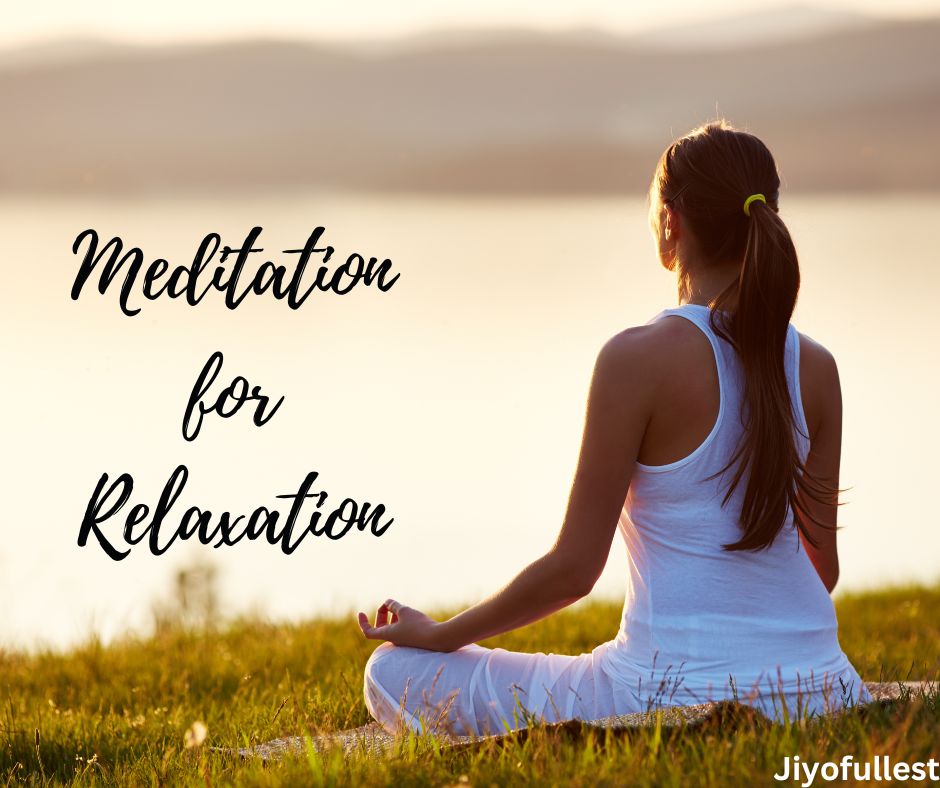Finding a moment of peace now a days can feel like a luxury. Between work, responsibilities, and constant digital distractions, stress seems to be a part of our daily lives. But what if there was a simple and effective way to bring calm and clarity into your day? That’s where meditation comes in.
Meditation has been practiced for thousands of years and is known for its incredible benefits for both the mind and body. Whether you’re looking to reduce stress, improve your focus, or simply feel more centered, Meditation for Relaxation
Table of Contents
ToggleWhat Is Meditation?
At its core, meditation is a practice that involves training your mind to focus and redirect your thoughts. It’s about being present in the moment, often through breathing, visualization, or mindfulness techniques. While it’s often associated with spiritual traditions, meditation can be completely secular and tailored to fit your personal beliefs or lifestyle
Benefits of Meditation for Relaxation
Meditation is one of the most powerful tools for achieving deep relaxation. Here’s how it helps:
1. Reduces Stress
One of the most well-known benefits of meditation is its ability to reduce stress. Regular meditation helps lower the levels of cortisol, the stress hormone, in the body. As a result, you’ll feel less anxious and more at ease.
2. Calms the Mind
We’re constantly bombarded with information and responsibilities. Meditation allows you to press pause, clear your mind, and create space for mental clarity and calmness.
3. Improves Sleep
Struggling with insomnia or restless nights? Meditation can improve the quality of your sleep by calming your nervous system and relaxing your body before bedtime.
4. Enhances Emotional Health
Studies show that mindfulness meditation can lead to improved mood, greater self-awareness, and reduced symptoms of anxiety and depression.
5. Boosts Concentration
A relaxed mind is a focused mind. Meditation enhances your attention span and helps you concentrate better, making you more productive and efficient throughout your day.
How to Start Meditating for Relaxation
You don’t need to meditate for hours to feel the benefits. Even a few minutes a day can make a big difference. Here’s a simple guide to get started:
Step 1: Find a Quiet Space
Choose a quiet and comfortable space where you won’t be disturbed. It could be your bedroom, a corner of your living room, or even a peaceful spot in the park.
Step 2: Sit Comfortably
Sit in a comfortable position. You can sit cross-legged on the floor or in a chair with your feet flat on the ground. Keep your back straight but relaxed.
Step 3: Close Your Eyes
Gently close your eyes and begin to breathe slowly and deeply. Inhale through your nose, hold for a few seconds, and exhale through your mouth.
Step 4: Focus on Your Breath
Bring your attention to your breath. Notice how it feels as it moves in and out of your body. If your mind starts to wander (and it will), gently bring your focus back to your breath without judgment.
Step 5: Start Small
Start with 5 to 10 minutes a day and gradually increase the time as you become more comfortable with the practice.
50 Quotes on Mediation that will Help you to Relax
“Meditation is not evasion; it is a serene encounter with reality.” — Thích Nhất Hạnh
“Quiet the mind, and the soul will speak.” — Ma Jaya Sati Bhagavati
“The thing about meditation is you become more and more you.” — David Lynch
“Meditation is the key to unlock the doors of mystery.” — Amit Ray
“Peace comes from within. Do not seek it without.” — Buddha
“Meditation is a way for nourishing and blossoming the divinity within you.” — Amit Ray
“The mind is definitely something that can be transformed, and meditation is a means to transform it.” — Dalai Lama
“Meditation applies the brakes to the mind.” — Ramana Maharshi
“Calm mind brings inner strength and self-confidence.” — Dalai La
“When you realize nothing is lacking, the whole world belongs to you.” — Lao Tzu
Short Meditation Quotes for Daily Calm
“Inhale the future, exhale the past.”
“Stillness is where creativity and solutions are found.”
“Let go, and just be.”
“Silence is the language of the spirit.”
“Breathe in peace, breathe out tension.”
“The present moment is the only time that exists.”
“Your calm mind is the ultimate weapon against your challenges.”
“Don’t try to calm the storm. Calm yourself. The storm will pass.”
“Be here now.” — Ram Dass
“Go within every day and find the inner strength.” — Catherine
Quotes on Mindfulness and Presence
“Mindfulness is the aware, balanced acceptance of the present experience.” — Sylvia Boorstein
“Every breath we take, every step we make, can be filled with peace, joy, and serenity.” — Thích Nhất Hạnh
“To understand the immeasurable, the mind must be extraordinarily quiet, still.” — Jiddu Krishnamurti
“The best way to capture moments is to pay attention. This is how we cultivate mindfulness.” — Jon Kabat-Zinn
“Meditation means dissolving the invisible walls that unawareness has built.” — Sadhguru
“You should sit in meditation for 20 minutes a day — unless you’re too busy. Then you should sit for an hour.” — Zen Proverb
“Mindfulness is simply being aware of what is happening right now without wishing it were different.” — James Baraz
“Meditation is acceptance. It is the acceptance of life within us, without us and all around us.” — Sri Chinmoy
“Observe your thoughts and let them pass like clouds in the sky.”
“Live the actual moment. Only this moment is life.” — Thích Nhất Hạnh
Relaxing Quotes for Inner Peace
Meditation is the art of doing nothing.” — Naval Ravikant
“When you own your breath, nobody can steal your peace.”
“The soul always knows what to do to heal itself. The challenge is to silence the mind.” — Caroline Myss
“Detachment is not that you should own nothing, but that nothing should own you.” — Ali ibn Abi Talib
“Tranquility is the highest human joy.” — Unknown
“Peace is not the absence of conflict, but the ability to cope with it.” — Mahatma Gandhi
“Let silence take you to the core of life.” — Rumi
“There is no greater wealth in this world than peace of mind.”
“A calm heart is the life and health of the body.” — Proverbs 14:30
Types of Meditation for Relaxation
There are many types of meditation, but here are a few that are particularly helpful for relaxation:
1. Mindfulness Meditation
This involves focusing on the present moment and observing your thoughts and feelings without judgment. It’s one of the most popular and beginner-friendly styles.
2. Guided Meditation
Perfect for beginners, guided meditation involves following a teacher or an app that leads you through a relaxing meditation session.
3. Body Scan Meditation
This practice helps you release physical tension by focusing on different parts of your body, starting from the head and moving down to your toes.
4. Loving-Kindness Meditation
Also known as Metta meditation, this involves sending thoughts of love and kindness to yourself and others, promoting a sense of emotional well-being and calm.
5. Mantra Meditation
In this type, you silently repeat a calming word, phrase, or sound (such as “Om”) to focus your mind and achieve a deeper state of relaxation.
Tips to Enhance Your Meditation
Be Consistent: Try to meditate at the same time every day to create a habit.
Create a Ritual: Light a candle, play soft music, or use essential oils to create a relaxing atmosphere.
Use Apps: Apps like Headspace, Calm, and Insight Timer offer great guided meditations and relaxation tools.
Don’t Judge Yourself: It’s normal for your mind to wander. Just gently bring your focus back to your breath.
Practice Gratitude: End your session by thinking of something you’re grateful for. It helps shift your mindset and enhances positivity.
FAQs on Meditation for Relaxation
Q1: How long should I meditate for relaxation?
Q2: What’s the best time to meditate?
Q3: Do I need to sit cross-legged to meditate?
Q4: What if I can’t stop my thoughts?
Q5: Can meditation help with anxiety?
Recent Posts
- Lucky Colors for Money by Zodiac Sign: What to Wear to Attract Financial Luck
- How to Glow up From Inside Out : 10 Tips, Checklist
- How to Improve Focus and Concentration Naturally
- Stress is Good: Change Your Perspective to Manage Stress in 2026
- How to Master Attention to Detail for Productivity, Focus & Emotional Wellbeing

